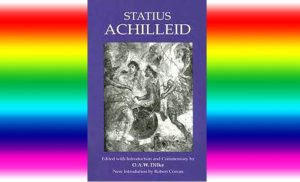Achilles’d | Statius | A Review
Achilleid by Statius-A Review
Introduction:
The ‘Achilleid’ is an unfinished epic poem written by the Roman poet Statius during the 1st century AD. This work is distinct from Statius’ other major epic, the ‘Thebaid.’ The ‘Achilleid’ stands as a unique and intriguing piece of literature, offering insight into Statius’ poetic craftsmanship and his interpretation of the mythological figure Achilles. Despite being incomplete, this poem has captured the attention of scholars and readers for its stylistic brilliance, thematic depth, and exploration of the heroic narrative.
Structure and Style:
The ‘Achilleid’ follows the heroic tradition of epic poetry and is composed in dactylic hexameter, the same meter used by ancient poets such as Homer and Virgil. This choice of meter contributes to the epic quality of the work, evoking a sense of grandeur and significance. Statius’ dexterity with language is evident in his use of intricate and ornate descriptions, vivid metaphors, and clever wordplay. His vivid imagery brings characters and scenes to life, creating an immersive reading experience.
Characters:
At the heart of the ‘Achilleid’ is the central character, Achilles, one of the most celebrated heroes of Greek mythology. Statius presents an alternative perspective on Achilles by focusing on his youth, vulnerability, and internal struggles. This portrayal adds depth to Achilles’ character, moving beyond his legendary feats to explore his human side. Other characters, such as Thetis (Achilles’ mother) and Chiron (his tutor), contribute to the development of the protagonist and the unfolding of the narrative.
Themes:
Heroism and Vulnerability: The ‘Achilleid’ challenges the traditional depiction of heroes as invincible and unflinching. Statius delves into Achilles’ vulnerabilities, both physical and emotional, highlighting the human aspects of heroism. This exploration of Achilles’ inner conflicts provides a fresh perspective on the hero’s journey.
Mother-Son Relationship: The dynamic between Achilles and his mother Thetis is a central theme. Thetis’ concern for her son’s safety and her attempts to protect him from harm reveal a more nurturing side of the mythological figure. This theme adds a layer of maternal emotion to the narrative.
Fate and Free Will: The tension between fate and free will is a recurring motif. Despite the prophecy of Achilles’ heroic destiny and early death, he attempts to exercise agency in shaping his own path. This theme prompts reflection on the interplay between destiny and individual choices.
Education and Mentorship: Chiron’s role as Achilles’ mentor and teacher is another significant theme. The interactions between Chiron and Achilles underscore the importance of guidance, education, and the passing down of wisdom from one generation to the next.
Unfinished Nature:
The ‘Achilleid’ remains incomplete due to the author’s untimely death. While the poem comprises just over a thousand lines, its unfinished status has generated debate among scholars. Some believe that the fragmentary state adds to the poem’s mystique, allowing readers to speculate about the intended direction of the narrative.
Conclusion:
In the ‘Achilleid,’ Statius showcases his mastery of language and storytelling, offering readers a nuanced and introspective portrayal of the legendary hero Achilles. Through its exploration of vulnerability, relationships, and the complexities of heroism, the poem challenges conventional perceptions of epic heroes. While the unfinished nature of the work leaves some questions unanswered, it remains a captivating piece of ancient literature that continues to inspire interpretations and discussions about heroism, fate, and the human experience. 0 0 0.
Achilleid Statius A Review
You May Like: The Aeneid by Virgil-A Review
N.B. The article originally belongs to the book entitled ‘The Reviews of Epic Literature Around the World Vol-II‘ by Menonim Menonimus.











